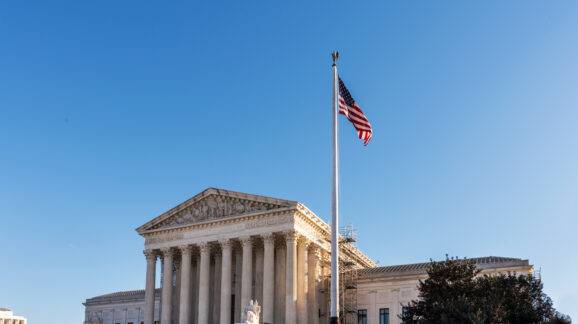Supreme Court Ends Chevron Doctrine that Favored Regulatory Agencies in Court

Photo Credit: Getty
The U.S. Supreme Court today overruled itself on a longstanding, controversial doctrine that gave regulatory agencies an unfair advantage in court – the so-called “Chevron doctrine.” CEI had filed an amicus brief supporting this outcome; and CEI legal and policy experts praised the ruling as a huge step towards restoring fairness for citizens in legal disputes with executive branch agencies.
Dan Greenberg, CEI General Counsel
“This is a welcome decision by the Court. It amounts to the Justices telling the rest of the government: do your job and stay in your lane. For the last four decades, the Chevron doctrine has allowed federal agencies to seize and exercise powers that our courts never should have surrendered. That failure of judicial supervision is over. Today’s decision is a huge step forward for self-government: it dethrones federal agencies and underscores both that Congress must be the ultimate authority on policy and that courts must be the ultimate authority on interpretation of the law.”
Devin Watkins, CEI Attorney
“With this decision, the Supreme Court has announced that judges must do their job: explaining what the law is, rather than deferring the interpretations of bureaucrats. The meaning of statutes will no longer swing wildly depending on who is elected president. Only the people’s representatives in Congress can properly change the statutory rules the public has to follow. This restoration of democratic accountability is the best thing the Supreme Court could have done.”
Iain Murray, CEI Vice President for Strategy and Senior Fellow
“Today’s Chevron ruling is a victory for the Constitution and for due process. Coupled with yesterday’s judgment on Jarkesy, the Court has sent a strong message that Congress cannot and did not give agencies the power to say what the law says and then try citizens under their interpretation of the law in their own courts. Citizens have a right to the protection of courts that can say, as Chief Justice Marshall said in the early days of the Republic, just what the law is, regardless of how convenient it would be for the executive branch to be able to say differently. This long-awaited ruling is an example of regulatory hygiene at work.”
Wayne Crews, Fred L. Smith, Jr. Fellow in Regulatory Studies:
“As we celebrate the rollback of Chevron deference as a limitation on executive branch power, we must keep in mind that while this pivotal decision makes a substantial impact, it still leaves much regulatory and administrative power intact.
“While the Supreme Court’s decision today signifies a pivotal moment in curbing overreach by regulatory agencies, it is crucial to recognize that Congress itself, especially since COVID, has been increasingly engaging in expansive legislative actions that disregard enumerated powers. This shift towards massive legislative enactments that fuse hyper-spending with regulatory interventions poses a greater threat than Congress over-delegating its powers.
“Additionally, as agencies now face restrictions on issuing arbitrary rules—unquestionably a welcome development—they may be induced to resort to ‘regulatory dark matter’, acting through untransparent means instead of explicit notice-and-comment rulemaking. To fix this problem, Congress must pass the Guidance Out of Darkness Act and related reforms to strike at sub-regulatory guidance.
“At this stage, ambiguous statutes aren’t our problem anymore – it’s the explicit ones that primarily threaten liberty.”
Daren Bakst, Director of CEI’s Center for Energy and Environment and Senior Fellow:
“For 40 years, courts have decided to play second fiddle to federal agencies when it comes to the interpretation of statutes. This has never made sense since it is the court’s job to interpret statutes.
“The Chevron doctrine said that when a statute is ambiguous, a court must defer to an agency’s interpretation even if the agency didn’t have the best interpretation of a statute, or even a good interpretation. All the agency had to do was have a reasonable interpretation.
“The entire regulatory process has been stacked against every American who was the subject of regulation. If an individual or business sued an agency and had a much better interpretation of the law than the agency, they could still lose because the agency didn’t have to meet the same standards as the public.
“The effect of today’s opinion simply means that courts will stop giving preferential treatment to federal bureaucrats.”
Stone Washington, CEI Research Fellow:
“Today marks a historic moment for the Judiciary. With the Supreme Court’s decision in Loper Bright and Relentless, federal judges must no longer abscond their oversight responsibilities by turning a blind eye to controversial administrative regulations. One of the primary obligations of a federal judge is the vigilant examination of agency rulemaking. As eternal guardians of the Constitution, judges must stand ready to overrule agency rulemaking whenever it exceeds the statutory limits prescribed by Congress. This is a fundamental aspect of our system of checks and balances.
“In today’s momentous 6-3 opinion, the Court rightfully put an end to the era Chevron deference. As Chief Justice Roberts indicated, judges must now honor the Administrative Procedure Act by holding executive agencies accountable for their actions. Judges must now exercise their independent judgement to assess agency actions, rather than simply deferring to the expertise of the bureaucrats themselves. Today’s decision properly restores the oversight responsibility of independent judges as a necessary check to bureaucratic overreach.”
> View the Supreme Court ruling on Supremecourt.gov
Related CEI analysis: